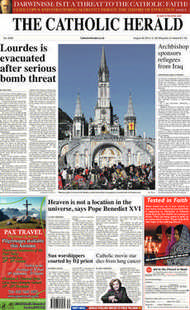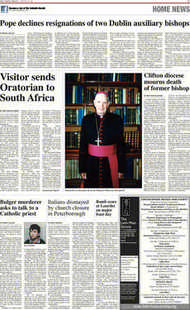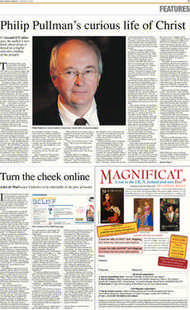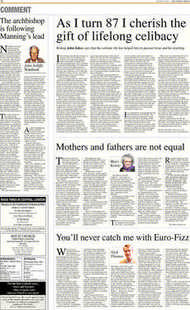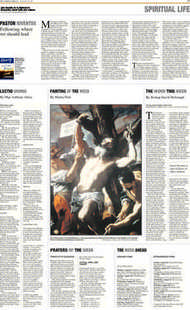Page 8, 20th August 2010
Page 8

Report an error
Noticed an error on this page?If you've noticed an error in this article please click here to report it.
Tags
Share
Related articles
The Darwin Jamboree
More About Amate Weight-throwing By Arnold Lunn
Thoughts On Controversy
True Faith Is Offensive
Mivart And 1 Darwin
DARWINISM AND THE FAITH
Dear Stratford,
I’d like to begin by briefly outlining why I believe this issue is so important. You do not need me to remind you of the huge problems afflicting our society: the annual slaughter of the unborn, the increasing perception of the elderly as a burden, the high incidence of depression among our young people, often manifested in self-harming. The root cause is the increasingly widespread belief that human life has no ultimate meaning, value or purpose, and this in turn derives from our society’s rejection of the supernatural.
The Church, of course, has the answer to these problems, but, in the current climate, it is increasingly difficult for her to obtain a hearing. Child sex abuse scandals do not help in this regard, but the problem goes much deeper. The Church is no longer taken seriously because many people regard Christianity as the intellectual equivalent of a fairy tale. Secularists make no secret of the belief system that underpins this view: Darwinian evolution. If, as Darwin held, life is simply the unintended consequence of natural selection acting on random mutations, there really is no need to invoke God as the ultimate cause of our existence, or to seek any meaning in life beyond the struggle to survive and procreate.
Let me summarise what the Catechism teaches on these matters. It states in paragraph 295 that “God created the world according to his wisdom. It is not the product of any necessity whatever, nor of blind fate or chance”; and, in paragraph 356: “He [Man] is the only creature that God has willed for its own sake.” Paragraph 36 teaches that ‘...God, the first principle and last end of all things, can be known with certainty from the created world by the natural light of human reason’. If there is one thing that the Pope and Richard Dawkins ought to be able to agree on, then, it is that Darwinian theory and Catholic teaching are diametrically opposed.
However, the response of many in the Church has been to accept the Darwinian view at face value, and to attempt to reconcile it with the Church’s teachings. These attempts invariably entail an acknowledgement that we are the products of natural selection acting on random mutations, coupled with an assertion that God set this process in motion. This deist conception of God effectively reduces Him to the status of a cosmic lottery player, and mankind to His rollover jackpot prize. Not surprisingly, it is viewed with disdain by most Darwinians, who recognise that, if you don’t require God as part of the explanation, there really is no reason to include Him at all. As their high priest, Richard Dawkins, succinctly put it: Darwin made it possible to be an intellectually fulfilled atheist.
Best wishes, Clive Dear Clive,
Eloquently put. I find myself having some sympathy with your concerns, but I cannot go along with your conclusions. Certainly I agree that in our highly secularised society Catholic teaching can seem to many people like a fairy tale. That is understandable. As C S Lewis came to see after a famous conversation with Tolkien, it is like a fairy tale. But it also happens to be true.
Let me start my side of the argument, as you did yours, with the Catechism. You cite three sections that you say prove the incompatibility of Catholicism with Darwinism. They do nothing of the sort. Take paragraph 295, which states that the world “is not the product of any necessity whatever, nor of blind fate or chance”. What the Catechism has in mind here – as the context makes clear – is the creation of the world from nothing. That would apply whether evolution takes place or not. The question is, why does anything exist at all? Why do the laws of nature, whatever they are, describe a real world? If everything evolved out of energy, where did the energy itself come from – or the many physical constants and laws that seem to determine the way it develops and how it acts? God is the answer to that question. According to para 301: “He not only gives them being and existence, but also, and at every moment, upholds and sustains them in being, enables them to act and brings them to their final end.” In para 283, the Church in fact seems quite well-disposed towards the theory of evolution: “The question about the origins of the world and of man has been the object of many scientific studies which have splendidly enriched our knowledge of the age and dimensions of the cosmos, the development of life forms and the appearance of man. These discoveries invite us to even greater admiration for the greatness of the Creator, prompting us to give him thanks for all his works and for the understanding and wisdom he gives to scholars and researchers.” As you say, man is deliberately willed by God (para 356), and in fact God’s providential care extends to all His created works, not just man. Why could that care not include some provision for the evolution of species? In para 302 we learn that “Creation has its own goodness and proper perfection, but it did not spring forth complete from the hands of the Creator. The universe was created “in a state of journeying” (in statu viae) toward an ultimate perfection yet to be attained, to which God has destined it.” The question is left open whether this “journeying” from imperfection includes some kind of evolutionary process. Surely that is a matter for empirical investigation.
You rightly disdain the idea that God simply set the process in motion, which then proceeded by random mutation without any further involvement on His part. But the Catechism talks of God sustaining things in being and bringing them to their final end, not merely letting them get on with it. He does the same with us individually. Believers know that the “random” events that happen to us each day form part of a wise order in which we are led towards God. Perhaps the same applies to genetic mutations.
Best wishes, Stratford Dear Stratford,
Thank you for your response. I take your points about the Catechism, although it seems to me that paragraph 295 encompasses more than just the world in the limited sense of land and sea, as it refers to God making creatures to share in His being. But, while I accept that the Church has not dismissed the notion of evolution in the broadest sense, I remain of the view that the Catechism does not – and cannot – endorse the Darwinian version, because it is incompatible with her view that all creatures (including Man) have been willed by God. If God wills something, it cannot also be attributed to chance.
Further, we should not underestimate the difficulty of formulating a philosophically and scientifically robust “non-Darwinian” version of evolution that is compatible with Church teaching. First, such theories invariably assume the existence of God. So, for example, you say that believers “know” that random events form part of a wise order in which we are led towards God. That may be true, but it will cut little ice with the unbelievers we are trying to reach out to. Further, such theories are generally unable to demonstrate that Darwinism is a causally inadequate explanation, so they have no grounds for invoking God as an additional causal factor in the evolutionary process. It follows that, if God is not required to explain evolutionary change, the best that they can do is demonstrate that evolution does not preclude the possibility of His existence, and that is an extremely weak philosophical basis for theism.
This huge concession to materialism is actually quite unnecessary. As you say, these are matters for empirical investigation, and modern science has taught us that what sets life apart from “non-life” is information. The genetic code – or DNA – is nothing less than an astonishingly complex set of instructions on how to build a human being. Sets of instructions do not (and cannot) evolve by natural selection acting on random mutations. By analogy, undirected natural causes can place letters on a scrabble board, but they cannot arrange them as meaningful words or sentences. To obtain a meaningful arrangement requires an intelligent agent.
This is not “god of the gaps”, as critics of Intelligent Design often allege. Rather, it is a straightforward inference to the best explanation, based on what we know about the origin of complex, specific and functional information. It does not simply assume the existence of God, and it dovetails neatly with traditional Church teaching that we can know Him from creation.
When Einstein demonstrated that the universe must have had a beginning, he provided compelling evidence for the traditional Christian view that it was created. Now science is providing compelling evidence that man was designed, just as the Church has always held.
Faith and reason do indeed go hand in hand, but there should be no room for outdated Darwinian materialism in this relationship.
Best wishes, Clive Dear Clive,
First, I question your assertion that “if God wills something, it cannot also be attributed to chance”. To attribute something to chance is simply to say that there is no cause known to science, no particular reason for the event. “Chance” is not an entity that might be responsible for the event: it is just an admission of ignorance. But a theist might well see the hand of God in a concatenation of circumstances that in scientific terms “just happened”. For God is the orchestrator of chance. As I said before, we believe that events are governed by a wise order, and God’s will is the source of that order, as it is of the very existence of things. So there is no conflict here. A thing may happen “by chance” and yet be willed by God, or at least permitted by God.
Similarly, we are not invoking God as an additional causal factor simply because Darwinism (to use that shorthand name) is inadequate. Whether the theory of evolution by natural selection is inadequate or not is for scientists to determine within their own terms of reference. Let us assume for the sake of argument that some future supercomputer, fed with all the assumptions of science and information about the early state of the universe, could model exactly how complex life forms developed from simple molecules under environmental pressure. Even then, God would still be needed to ground the existence of every stage in the process, and the laws that govern it. God is the Act of Being.
I am not arguing for Darwinian materialism. Writers like Richard Dawkins and Daniel Dennett seem to think evolution is the “theory of everything”. It isn’t. I am simply saying that a theory of evolution is not necessarily incompatible with a Christian understanding of providence and design. Professor Ernan McMullin, for example, argues that we should take a closer look at St Augustine’s idea of “primordial seeds” or “seminal reasons”. His view was that God implanted in nature, from the beginning, the potential to unfold into the various species or families of creatures. We can trace these “seeds” back to the ideas in the mind of God, and then follow the way they unfolded in time through the process of evolution. The forms of creatures pre-existed in God, in other words, and the world was designed in such a way that they would emerge from it in due time.
In order to make sense of this today, we need to rescue notions of formal and final causality that have fallen into oblivion. I think this is part of what is meant by the “broadening of reason” the Pope was calling for in his Regensburg speech back in 2006.
Best wishes, Stratford Dear Stratford,
Thanks for your reply. Are you saying that mankind was merely permitted to come into existence by God? I am fairly sure that this is not the meaning of “willed” intended by paragraph 356 of the Catechism; nor does it accord with the teaching of the Scriptures. It does, however, highlight the dangers of attempting to reconcile Church teaching with the Darwinian view. Indeed, I hope that I am not being too melodramatic if I say that it leads to one of the most fundamental principles of our faith being compromised. Further, it makes it much more difficult to make the case for the uniquely precious and privileged status of humanity that is the basis for the Church’s teachings on everything from abortion to social justice.
The concept of “primordial seeds” is interesting but it is similar to your own “wise order applying to genetic mutations” in that it assumes the existence of God, and then tries to find a role for Him in the evolutionary process. The difficulty with this is that if, as Darwinists claim, that process works perfectly well without any divine input, why should we invoke God at all? Unless, therefore, we can show that Darwinism is unable to explain particular features of the natural world, we will never be able to develop a convincing case for God’s role in creation.
As I have already mentioned, Darwinism cannot account for the existence of biological information. Pointing up its inadequacies is, however, only half the battle: we also need to make a positive case for the design alternative. The key to this is the relatively simple and straightforward insight that only a designer – that is, an intelligent agent – could be responsible for the information in DNA. The beauty of this approach is that it does not simply assume the existence of God; nor does it try to accommodate Him within an essentially materialist framework that could manage perfectly well without Him.
In one sense, there is nothing particularly new or radical in this: it is simply an updated and powerful restatement of St Thomas Aquinas’s argument from design. It is only “controversial” to the extent that secular philosophy had assumed that Darwin had rendered the design argument (and God) obsolete, and is therefore unable to come to terms with its re-emergence. The Church, of course, should have no such problems, but seems strangely reluctant to endorse it. Perhaps, however, that should form the basis of another discussion.
Best wishes, Clive Dear Clive,
Your patience with me is appreciated. The main point I want to make is one made by Cardinal Christoph Schönborn in Chance or Purpose (and Conor Cunningham in his forthcoming Darwin’s Pious Idea) – that people on all sides of the debate tend to make dubious philosophical assumptions without realising they are doing so. The problem with Intelligent Design approaches is that they make God into an agent within the cosmos, missing the point that he is not a cause within the world, like other causes investigated by science. God is a different type of cause: the cause of the world as such. This does not mean that God merely “permits” the development of a new species. He actively wills it, but he brings it about and shapes its ends by a kind of “vertical causation” that is not amenable to scientific investigation.
Evolutionists are just as bad. The scientific case for macro-evolution does not appear to be as strongly established as many of them would like us to believe. James Le Fanu in Why Us? argues that evolutionary science and genetics are on the brink of a paradigm shift. I am not qualified to judge the scientific debate, but it is clear to me that many exponents of evolution assume their theory must be a complete explanation not for good scientific reasons but because of their ill-founded commitment to atheistic materialism.
Daniel Dennett’s blockbuster, Darwin’s Dangerous Idea, denies that biological information needs a conscious creator. There are no instructions from on high, just molecules and chains of molecules that combine and recombine in different ways, leading to the replication (with occasional variations) of certain cells. The accumulation of “positive mutations” over time remains hypothetical, it has not been demonstrated, and yet Dennett’s faith in evolution is religious in its fervour. What is more, he assumes the human mind is a product of material evolution, even though our conscious experience is itself clearly a non-material phenomenon. I am left feeling that while evolution may indeed occur, it cannot offer a complete account of reality, and there are plenty of hints that an even bigger idea will be needed to take science to the next level.
So perhaps we are not so far apart after all. I recommend Joseph Bolin’s booklet Darwin and Evolution (CTS) for a more developed discussion of many of the points we have raised. Among other things, he says that St Thomas’s view of creation “leaves room for a natural sequence such as evolution in the created world, whereby one type of living being comes from another”. Brolin also distinguishes the view that evolution is a fact from the theory that natural selection and random mutation constitute the principal cause of evolution.
The jury is still out. What we can be sure of is that human beings are not the product of “chance” alone but are willed by God, in love and for love.
Best wishes, Stratford
Clive Copus is a director of the Prolife Alliance. The views expressed here are his and not those of the Alliance. Stratford Caldecott is the editor of Second Spring and the author of Beauty for Truth’s Sake. He lives in Oxford
blog comments powered by Disqus


